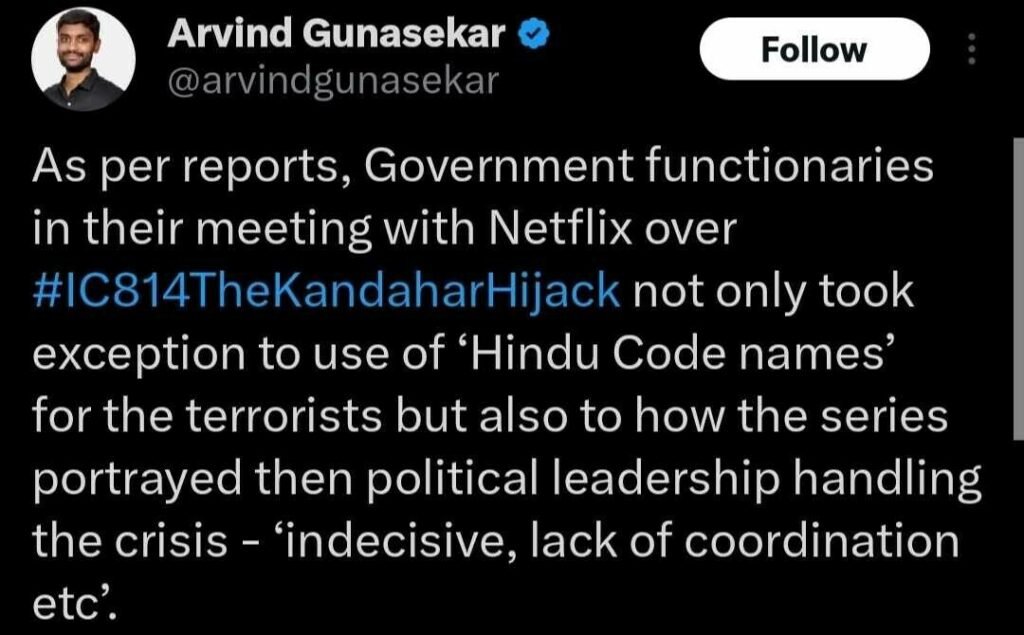Netflix has once again found itself at the center of a heated controversy, this time involving its new Indian series, IC-814: The Kandahar Hijack. The show, a fictionalized version of the 1999 hijacking of Indian Airlines Flight 814, has sparked outrage on social media and drawn the ire of the Indian government. The controversy centers around the portrayal of the hijackers, who were depicted with Hindu names and identities, leading to widespread criticism and demands for corrective action.
The 1999 Hijacking: A Brief Overview
To understand the crux of the controversy, it is essential to revisit the actual events of December 1999. Indian Airlines Flight 814, en route from Kathmandu to Delhi, was hijacked by five armed men shortly after takeoff. The plane was diverted to several locations before finally landing in Kandahar, Afghanistan, which was then under Taliban control. The hijackers demanded the release of several militants imprisoned in India. Including Masood Azhar, a notorious figure who later founded the militant group Jaish-e-Mohammed.
After a week-long standoff. The Indian government conceded to the demands. Releasing three militants in exchange for the safe return of the passengers and crew. The hijacking was a significant event in India’s history. Leaving a lasting impact on the country’s security policies and its relationship with neighboring Pakistan.
The Controversy Around IC-814: The Kandahar Hijack
The Netflix series, which premiered last week, attempts to dramatize this harrowing incident. However, it quickly drew criticism for what many perceived as a misrepresentation of the hijackers’ identities. In the series, the hijackers are shown with Hindu names. Which led to a backlash on social media and the trending hashtag #BoycottNetflix. Critics argued that the show misleads viewers by portraying the hijackers as Hindus. Whereas, in reality, they were Muslims with specific code names.
Members of Prime Minister Narendra Modi’s Bharatiya Janata Party (BJP) were particularly vocal in their disapproval. Amit Malviya, head of the BJP’s social media unit, accused the series of “legitimizing the criminal intent” of the hijackers and misleading audiences. The series was also criticized for allegedly showing the hijackers in a positive light. A claim that has fueled the outrage.
Netflix’s Response to the Backlash
In response to the growing controversy, India’s Ministry of Information and Broadcasting summoned Netflix officials. Following the meeting. Netflix announced that it would update the series’ disclaimer to clarify the real identities and code names of the hijackers. Monika Shergill, Vice President of Content at Netflix India. Stated that the disclaimer was being updated “for the benefit of audiences unfamiliar with the 1999 hijacking of Indian Airlines Flight 814.”

This move by Netflix appears to be an attempt to address the concerns of both Indian government and viewers. However, it remains to be seen whether this action will be enough to quell the outrage.
The Broader Implications of the Controversy
The controversy surrounding IC-814: The Kandahar Hijack is not an isolated incident. In recent years, streaming platforms like Netflix and Amazon Prime Video have faced increasing scrutiny in India. Particularly from Hindu nationalist groups who claim that certain content is offensive to the country’s majority religious population. This tension between creative expression and cultural sensitivity has led to a growing number of complaints and calls for censorship.

The Indian government has also shown a willingness to intervene in such matters. Reflecting a broader trend of tightening control over digital content in the country. This raises questions about the future of streaming platforms in India and the extent to which they will be able to maintain creative freedom in the face of pressure.
The Role of Media in Shaping Historical Narratives
One of the central issues in the IC-814: The Kandahar Hijack controversy is the role of media in shaping historical narratives. The series, while fictionalized, is based on real events that hold significant importance in India’s recent history. When such events are dramatized for entertainment purposes, there is always the risk of inaccuracies or misrepresentations that can lead to misunderstandings.

In the IC-814 Netflix series controversy, the portrayal of the hijackers with Hindu names is seen as a distortion of history. This misrepresentation could mislead viewers unfamiliar with the real events, sparking a broader conversation about the responsibility of content creators to ensure accuracy when depicting sensitive historical subjects.
Does Netflix Remove This Series?
The controversy surrounding IC-814: The Kandahar Hijack highlights the complex relationship between creative freedom and cultural sensitivity. While Netflix’s decision to update the series’ disclaimer is a step towards addressing the concerns raised. It also serves as a reminder of the challenges faced by content creators in navigating the diverse and often contentious landscape of historical narratives.
As streaming platforms continue to expand their reach in India, they will likely encounter more such controversies. Prompting ongoing debates about the balance between artistic expression and respect for cultural sentiments. Whether IC-814: The Kandahar Hijack will weather the storm of criticism or become a catalyst for further discussions on these issues remains to be seen. For now, it stands as a potent example of the power of media to shape public discourse and the responsibilities that come with it.











